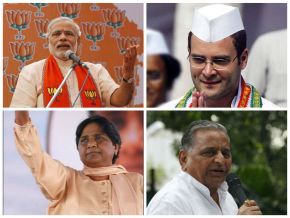 Analysts believe that the strong Modi wave in the state will help the saffron party win 35 to 40 seats much to the detriment of the Congress and Samajwadi Party, who are fighting the anti-incumbency factor at the Centre and state respectively. Bikash Mohapatra reports.
Analysts believe that the strong Modi wave in the state will help the saffron party win 35 to 40 seats much to the detriment of the Congress and Samajwadi Party, who are fighting the anti-incumbency factor at the Centre and state respectively. Bikash Mohapatra reports.
Every election, the state of Uttar Pradesh has played a crucial role and this Lok Sabha election has been no different. Offering a whopping 80 seats, UP still holds the key.
Realising the significance of this state, both national parties -- the Congress and the Bharatiya Janata Party -- and other political entities have left no stone unturned in their bid to maximise their returns from the state.
In fact, the two biggest candidates are fighting it out from the state. While the National Democratic Alliance’s prime ministerial candidate Narendra Modi contested from the Varanasi seat, Rahul Gandhi sought his candidacy from Amethi.
After the final phase of voting got over on Monday there have been a slew of exit polls, most predicting a landslide victory for the BJP-led alliance. While it is premature to make any prediction till the results are out on May 16, one cannot argue that the political landscape of the state has undergone a drastic change in recent years.
In the last general elections, the seats were more or less evenly spread among these four parties. However, the equation has since changed.
While the Congress and the Samajwadi Party have lost considerable ground, the BJP has had a renaissance of sorts. The Narendra Modi factor, perceived as the harbinger of hope across the country, has had a significant impact in Uttar Pradesh. As a result, the mood in the state unit of the party is buoyant.
“We should be winning more than 50 seats,” said the party’s spokesperson Vijay Pathak. “People of the state want change and they believe Modi can bring in that change,” he said adding, “There’s excitement among the party workers and people alike and that will help us do well.”
However, if experts are to be believed, even though the BJP will do well, it won’t cross the 50-seat mark. “In the cities, the NaMo factor will definitely make a difference. But I don’t foresee the BJP winning more than 35-40 seats,” says eminent political analyst Manoj Tripathi.
Senior journalist Ramesh Verma concurs. “At the moment, especially among the youth, there is a Modi craze. The NaMo factor will help the BJP considerably, especially in the cities,” he explains. “However, the BJP won’t win 50-plus seats as they have been claiming,” continues Verma, adding, “They should win around 30-35.”
Complete Coverage: Elections 2014
The experienced duo, while agreeing that the Congress will lose considerable ground, largely owing to the central government’s failure to bring down the rate of inflation, also believe the Bahujan Samaj Party stands to gain from the anti-incumbency factor within the state, something that will be to the detriment of the Samajwadi Party.
“In rural UP, caste-based politics will continue be a key factor and as such, parties like BSP and SP will do well,” explains Tripathi. “In fact, the BSP should do better than the SP,” he adds, before proceeding to elaborate on the reasons for the same.
“Besides the anti-incumbency factor, Mulayam Singh Yadav’s decision to partner up with Kalyan Singh during the 2009 elections will also work against him. Also, the fact that the SP has been blamed solely for the failure to control the riots in Muzaffarnagar last year, will make sure that the Muslim vote gets divided between the BSP and the Congress,” explains Tripathi.
“In pockets where caste is the sole factor, the BSP stands to benefit the most,” reiterates Verma.
“The two parties that will suffer the most in these elections will be the Congress and the SP,” he adds, before elaborating, “The Congress-led government at the Centre failed to control the inflation, and there’s a lot of anger among the people because of that. Another factor that weighs against the Congress is the fact that it doesn’t have a ‘real’ leader. Rahul Gandhi has done his bit to improve the party’s fortunes. But his roadshows and rallies have had no mass impact. People (including the youth) perceive him as an ‘immature politician’. As such, all his efforts haven’t been beneficial for the Congress,” says the senior journalist.
“As regards to the the Samajwadi Party, suffice to say their government (at the state) has failed. Consequently, their graph has also gone down. It is something that will reflect in their performance at the national level.”
Whatever be the case, the fact remains that the polls will go a long way in determining the overall fortunes at the Centre.
Uttar Pradesh should once again live up to its reputation. Rest assured, the prime minister elect will be the ninth such candidate from the state.










